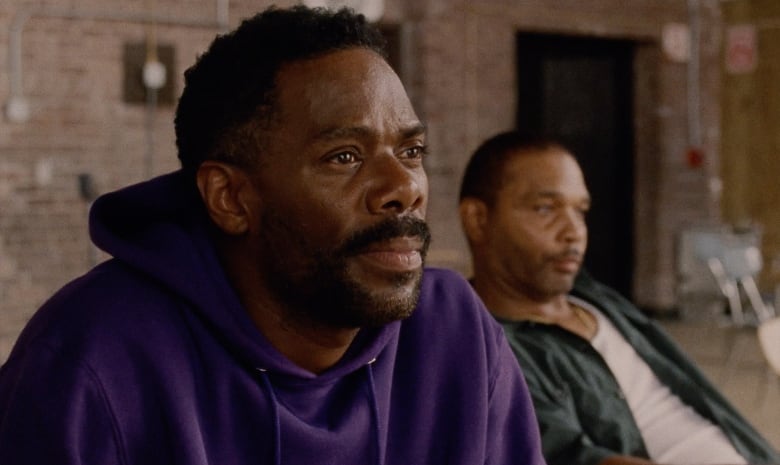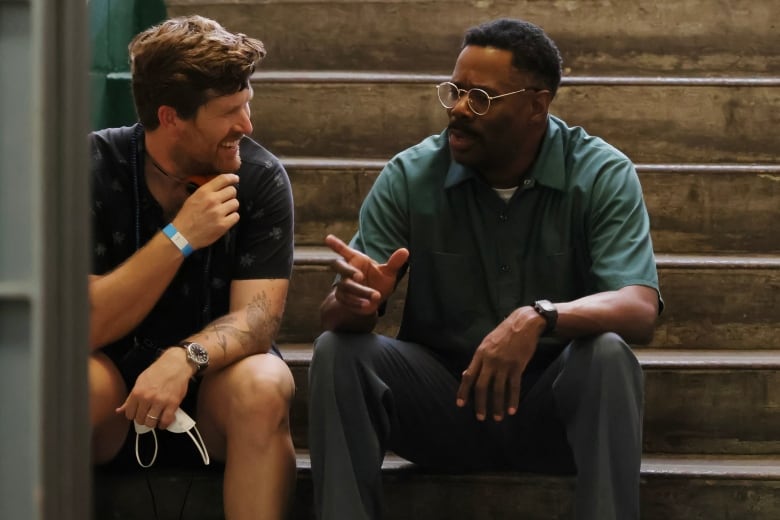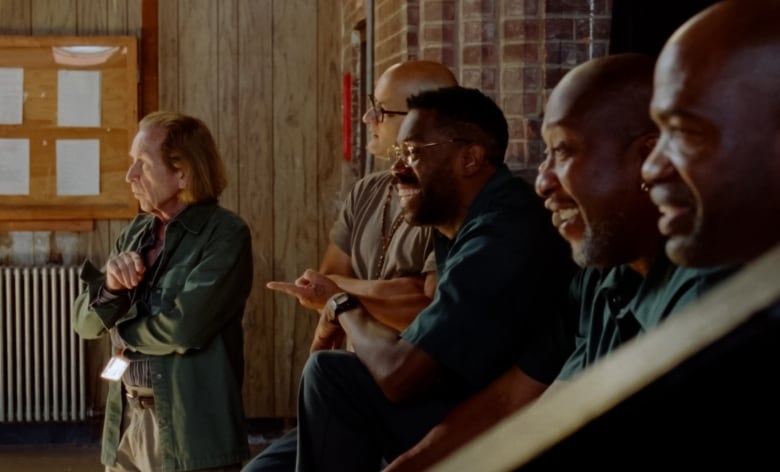There have been many films set in prison. Some with great performances. But there’s never been a film like Sing Sing.
The story revolves around the two Divines.
John (Divine G) Whitfield is a prisoner at the maximum-security prison Sing Sing. Convicted of a crime he didn’t commit, he pours himself into writing and activism. He’s a jailhouse lawyer, an author and a founding member of the prisoner-led theatre company RTA, Rehabilitation Through the Arts.
Then there’s Divine Eye, otherwise known as Clarence Maclin. He’s a wolf who prowls the prison yard fleecing the weak, and yet, some RTA members see potential hiding under the hustler’s bravado.

The kindly jailhouse veteran and the intimidating thug may seem like shopworn characters, but what elevates Sing Sing is the veracity of the actors. Combined with the actuality of the setting (a decommissioned jailhouse, down the river from the actual Sing Sing), the result is nothing less than a testament to the transformational power of art.
Sing Sing comes from the filmmaking team of Greg Kwedar and Clint Bentley.
I first discovered their work with 2022’s Jockey, a film with dirt under its fingernails set in the world of horse riders and trainers. While Jockey was anchored by the heartfelt performance of character actor Clifton Collins Jr., many of the other actors on the screen were real-life jockeys.
With Sing Sing, Kewdar and his filmmaking partner and co-writer Clint Bentley doubled down on the idea of inviting a community into the filmmaking process by casting ex-prisoners, actual alumni of the very real RTA program.
WATCH | The official trailer for Sing Sing:
When you see the prisoners sitting in a circle warming up, Sean (Dino) Johnson, Cornell (Nate) Alston, Camillo (Carmine) LoVacco and David (Dap) Giraudy are essentially playing versions of themselves.
In fact, RTA is one of a number of prisoner-led theatre companies.
In Canada Shakespeare in the Ruins runs workshops at Stony Mountain prison outside of Winnipeg. There’s also Victoria’s William Head on Stage, Canada’s longest running prison theatre company.
B.C. actor Patrick Keating has performed at William Head, where he has also worked as a facilitator.
Speaking to CBC News, he explained how he caught the acting bug when was serving a sentence for robbery in Matsqui Penitentiary in Abbotsford, B.C.
“When you’re inside [prison] there’s a lot of masks that you wear, there’s definite armour that you put on, this allows you to drop that and to be something else.”
B.C. actor Patrick Keating explains to CBC’s Eli Glasner how he fell in love with acting while serving out a sentence for bank robbery at Matsqui Penitentiary.
In the film Sing Sing, for pure grit and presence, no one comes close to what Maclin channels on the screen. There are not many actors who could hold their own with the Oscar-nominated Colman Domingo.
As Whitfield, Domingo exudes a guarded sense of optimism, someone who has been battered by the justice system and husbands his sense of hope. But that faith is tested when Maclin joins the actor’s circle.
When Whitfield tries to offer some advice, Maclin spits back, “You don’t get to tell me what I need in prison.”

What Maclin show with vivid clarity is a man warped by a lifetime of conflict and abuse. The act of acting requires vulnerability, but in prison that’s a weakness.
The story begins with the RTA group preparing for a new production. The group’s facilitator, Brent, is played by Paul Raci. You may remember him as the long-haired addiction therapist from The Sound of Metal.
A veteran actor and teacher, Raci is perfectly cast as a man who helps the men explore their characters. Part of the pleasures of Sing Sing come from watching Brent pull the prisoners out of their shells with simple warm-up exercises, such as when he asks the group to imagine their most perfect spot. The unscripted stories they share are touching and tinged with tragedy.

As production coalesces around the original play Breakin’ the Mommy’s Code, a rich gumbo of genres and characters, members of the group respond differently. Whitfield’s pride is tested. Maclin lands an enviable role, but will the newest recruit truly engage with the material as Prince Hamlet?
At its heart, Sing Sing is a testament to the power of art and its ability to help people step outside themselves. Art can be prayer. It can be an escape and therapy. In too many institutions the arts are seen as unnecessary. Extracurricular activities with unquantifiable benefits.
But then how else could you explain what Clarence Maclin does? Going from a prisoner who couldn’t see a future to someone who by all rights should be an Oscar contender.
CBC’s Eli Glasner spoke with Sing Sing star Colman Domingo and director Greg Kwedar about sharing scenes with ex-prisoners playing themselves and the powerful performance of ex-prisoner and RTA alumni Clarence Maclin.
While prisons are often seen as a place of punishment, Sing Sing is about the living breathing work of rehabilitation. You can see it in faces of the actors on opening night and in the careful choice of language.
When Maclin first enters the group, his speech is litter with the N-word. At one point, Whitfield corrects him, saying they don’t use that word. Instead, the members call each other “beloved.”
That’s a choice that Domingo explained to CBC News was intentional.
“You say my beloved … You have to deconstruct any, hyper-masculine thoughts. You have to use the word love. That’s what it is in their brotherhood. Because that’s your brother.”
This post was originally published on this site be sure to check out more of their content.








